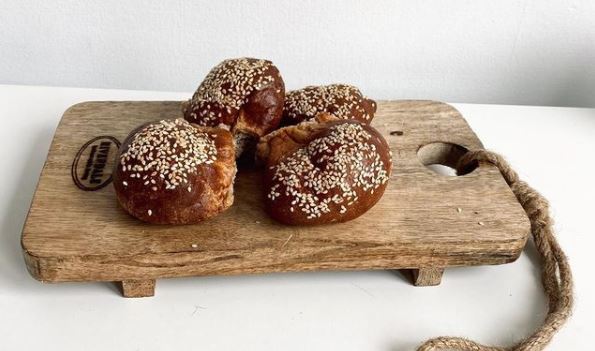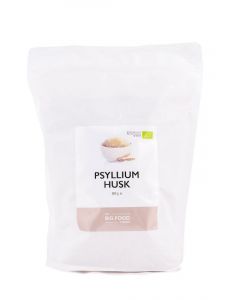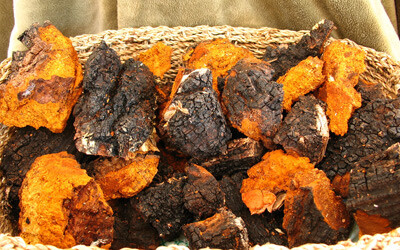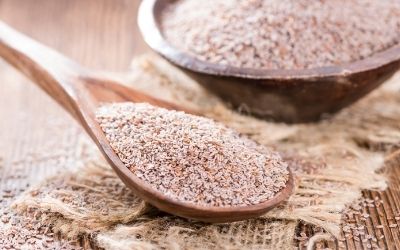What are Psyllium fibers and why should you use them?
- By Lotta Elisabeth
- 30 Dec 2021


What are psyllium fibers?
Psyllium fibers, or psyllium husk, are the outer membranes of what is also called flea seed. Flea seed comes from the plantago ovata plant, which is family of the plantain.
Fibers have different functions, depending on the type of fiber. Fiber is not digested by the gastrointestinal tract and enters the colon undigested. Depending on the type of fiber, they are still digested in the colon by the intestinal bacteria or they are transported further through the intestines to be subsequently formed into faeces. Both types of fiber are very important for good (intestinal) health. In this blog you will get an answer to your question to which group psyllium fibers belong, how you can use them and what they are good for.
What different types of fibers are there?
Dietary fiber can be divided into two groups:
Fermentable fibers
These are the fibers that are broken down by the intestinal bacteria, this process is called fermentation. These fibers are the prebiotics: food for the intestinal bacteria (probiotics). During the fermentation process, these fibers are converted into certain acids, which our body can use again. The amount of energy released in this fermentation process is approximately 2 kcal. per gram of fiber. The intestinal cells can make good use of this energy. About 70% of the dietary fiber we eat is fermented. These fibers are mainly found in grains and fruits. The fiber can lower LDL cholesterol.
Non-fermentable fiber
These fibers are not broken down by the intestinal bacteria and leave the body unchanged. However, this does not mean that these fibers have no function! These fibers increase the volume of the intestinal contents and this improves bowel movements.
Both fermentable and non-fermentable have many health benefits, which is why a fiber-rich diet is so often brought to the attention by the Netherlands Nutrition Center and others. Eating enough dietary fiber has been linked to a reduced risk of cardiovascular disease, type 2 diabetes and colon cancer. In addition, dietary fiber ensures a good bowel movement and this helps prevent other uncomfortable bowel and stool ailments. In addition, there are some indications that fiber may contribute to maintaining a healthy weight, but the evidence for this is still insufficient.
Do you want to know the exact figures and percentages of the influence of dietary fiber on health? Take a look at this page of the nutrition center (Source: Voedingscentrum.nl)
How do you get enough dietary fiber?
Fiber is mainly found in whole grains, legumes, vegetables, fruits, nuts and seeds. It is therefore important to get nutrition from these food groups on a daily basis. In addition, it is very important to drink enough water, because if you drink too little water, fibers can actually cause constipation. Fiber needs moisture to expand and form good stool.
How many grams of fiber do you need per day?
It is recommended to consume 30 - 40 grams of dietary fiber per day. For many people this is a big challenge! Yet you can easily get this if you eat a lot of unprocessed, plant and whole grain foods.
How can you use psyllium fibers?
Psyllium husk fibers belong to the group of non-fermentable fibers and therefore mainly have the function of promoting bowel movements. Psyllium fiber can absorb up to 10 - 40x its own weight in water, so it is very important to drink good water if you decide to use psyllium fiber to improve bowel movements. A low dose of psyllium fibers has a mild laxative effect and can be used for constipation, while a high dose of psyllium fibers counteracts diarrhea and thus actually has a slightly constipating effect. So psyllium fibers can be used for both types of bowel movement problems. 
With which complaints does psyllium fibers help?
Psyllium fibers can support various complaints, including:
- chronic constipation
- diarrhea, faecal incontinence
- increased permeability of the intestinal wall (leaky gut)
- celiac disease (increase fiber intake, gluten replacement)
- IBS (irritable bowel syndrome)
- chronic intestinal inflammation (Crohn's disease, ulcerative colitis)
- (prevention) diverticulosis
- hemorrhoids
- anal fissures
- prevention of colorectal cancer
- hyperlipidemia
- metabolic syndrome
- diabetes mellitus
- (prevention) cardiovascular diseases
- prevention of weight gain, obesity
- prevention of gallstones (for weight loss)
- dyslipidaemia during pregnancy (and possible prevention of pre-eclampsia)
- for improving daily fiber intake
(Source: Orthokennis.nl)
 Dosage psylliumvezels
Dosage psylliumvezels
Psyllium fiber can be used in dosages ranging from 7 - 30 grams per day. It is important to drink at least (!) 30 ml of liquid (preferably water) per gram of fiber.
Psyllium fibers can lower the absorption of medicines, so take medication at least 1 to 2 hours before taking the fibers or 2 hours afterwards and always inform your doctor and pharmacy if you are going to use psyllium fibers.
Contraindications Psyllium fiber
Contraindications for the use of psyllium fibers are: hypersensitivity to psyllium, abnormal strictures of the gastrointestinal tract, peptic ulcer and esophageal disorders, low blood pressure, difficulty swallowing, colorectal denomas and an age under 6 years.
(Source: Orthokennis.nl)
Did you know that you can also bake with psyllium fibers?
Psyllium fiber is also a very popular ingredient in gluten-free baking! Gluten normally provides elasticity and structure in baked goods such as bread, wraps and cake. This is often lacking in gluten-free flours. People who cannot tolerate gluten solve this problem by adding psyllium fiber to their dough or batter. In general, the ratio is 5 - 10 grams per 500 grams of flour for a good baking result.
 Low-carb psyllium husk buns recipe
Low-carb psyllium husk buns recipe
These delicious and easy-to-make psyllium husk buns are perfect for a low-carb diet. This way you still have the 'bread feeling' without the carbohydrates. Linda made a recipe video so you can make them too.
Ingredients psyllium husk buns:
- 130gr Greek yogurt
- 4 eggs (M)
- 40gr almond flour
- 30gr psyllium husk powder
- 10gr coconut flour
- 2 tsp baking powder
- pinch of salt
(Oven at 160 degrees)









